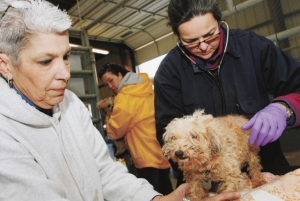Recovering: Freed dogs start the journey to homes of their own
By Catharin Shepard
Published in News on February 8, 2009 2:00 AM

News-Argus/GREG SOUSA
Dr. Agnes Davis, right, of the National Veterinary Response Team, and Sheila Gardnes examine a male poodle that Wayne County animal control authorities seized Friday from Thornton Kennel. Rescuers found 283 dogs, including Lhasa apsos, Shih Tzus, Maltese, poodles and Chihuahuas, housed in filthy conditions. Today, the rescued animals are resting at the Wayne Agricultural Fairgrounds.

News-Argus/GREG SOUSA
A volunteer takes care of two Maltese dogs that Wayne County animal control authorities seized Friday. The dog on the right was missing all of its teeth, just one of many ailments volunteer veterinarians discovered when they started examining the rescued dogs.
A miniature poodle, her matted white fur dyed a filthy yellowish-brown from urine and feces, was the first dog carried off the trailer and into the frigid Wayne County fairgrounds barn early Friday morning.
Shivering in the cradled arms of a volunteer, she seemed afraid to make a sound.
But as more than 100 Chihuahuas, Shih Tzus, Yorkshire terriers, poodles and other small breed dogs were brought into the triage area for assessment, some slowly started to find their voices.
"They're free, finally," said one Humane Society of the United States (HSUS) volunteer, as the dogs began to bark.
The noise inside the horse and cattle barn steadily increased as the 283 dogs seized from Thornton Kennel Friday morning grew more accustomed to human interaction.
Dogs in puppy mill situations rarely receive personal attention, but are quick to warm up to people once removed from the site, said Diane Webber, director of emergency sheltering for the Humane Society.
"They learn that if they mess their cage, someone will open it," Mrs. Webber said. "It's more than attention, it's compassion and care."
Proper care is something the dogs hadn't received in a long time, said Barbara Arntsen, communications director and spokesperson for Wayne County.
"Most of them have lived in cages all their lives," she said. "The vets are overwhelmed."
The breeder's three buildings on Westbrook Church Road were so inundated with ammonia and feces, volunteers couldn't enter them without protective masks.
"It's pretty sad," said Kirby Harriss, a Lenoir County veterinarian who examined the dogs. "There are several mothers with little tiny puppies in very sad condition."
Once the dogs were safely transported to the barn, the team of vets set to work conducting physical exams to determine and document their condition.
The check-ups revealed that many of the dogs have cataracts and other eye problems. At least one is missing an eye, and another is nursing puppies she has probably never seen before.
"Her eyes are glued shut with goo," Ms. Harriss said.
Some of the dogs are emaciated, a condition possibly related to their badly decayed teeth. Many have ingrown nails, and the fur on their feet and legs is so overgrown and matted, they cannot walk.
"Their feet haven't touched the ground, probably in years," Ms. Harriss added.
The wintery weather early Friday morning hampered the workers' efforts at the triage site. The barn's pipes were frozen, and volunteers had to rely on water from a single hose and a shower in the fairgrounds bunkhouse. The toilets were not working, and the barn itself did not have heat.
The rescue operation was a collaborative effort by Wayne County Animal Control, the Humane Society of North Carolina, the Humane Society of the United States, PetSmart Charities and other supporting agencies. Volunteers from as far away as Canada, Washington, D.C., and California were on the site by 5 a.m. Friday to help.
Crews have been with the animals ever since.
Wayne County animal control officials first learned of the situation at Thornton Kennel in December 2007, thanks to tips from several people who bought dogs from the puppy mill and recognized the poor conditions.
"Wayne County Animal Control has really put this together," said Amanda Arrington, director of the state chapter of the HSUS.
The state and national agencies were called in because Wayne County "didn't have the resources" to handle so many dogs at once, Ms. Arntsen said.
Officials could not immediately put a price tag on the seizure operation, but removing the dogs from the site and caring for them carries significant costs.
"It really is a big expense," Ms. Arrington said. "It's not a cheap thing to do. It's a lot of money, tens of thousands."
PetSmart Charities, the 501(c)3 branch of national pet store chain PetSmart, deployed a mobile response unit -- the "Emergency Response Waggin'" -- that also activates to help animals during natural disasters. The charity donated between $50,000 and $60,000 of pet supplies to support the effort, and highly experienced volunteers from the organization were on hand to help.
"I've done two hurricanes. Floods, fires, two puppy mills," said Laurel Ley, field manager for the PetSmart Charities volunteers.
Although the PetSmart volunteers were not allowed to touch the animals for legal reasons, they worked through the morning to unload flats of food and put together crates to hold the dogs.
Pet Supplies "Plus" on Berkeley Boulevard also donated 200 pounds of Science Diet and Eukanuba small breed dog food for the more emaciated dogs in need of specialized nutrition.
It's unclear how long the dogs will be held at the fairgrounds. For now, the focus is on the dogs' welfare, and their legal status.
"It all depends on the case," Mrs. Webber said. "They'll stay here until all of the legal proceedings are worked out."
The case should move quickly, thanks to the months of work that went into preparing for the seizure, Ms. Arntsen said.
"We go to court on Tuesday," she said. "Our priority is to get the dogs safe. If there are other charges or legal action that can be done, we will pursue that."
During the hearing, officials plan to ask the dogs be taken from the breeder, said Justin Scally, Wayne County animal control director, who coordinated the seizure locally.
"We're requesting permanent custody be awarded because of the conditions they were living in," he said. "Because of their poor health, we feel they should be awarded to the county."
No criminal charges have been filed, but the case is still under investigation, Scally said.
"We're looking at several different options," he said.
Officials locked down the fairgrounds on Saturday to give the dogs a chance to calm down and rest.
"We're having a lot of people showing up and wanting to help the dogs, adopt the dogs," Scally said. "Techni-cally, these dogs are evidence. We can't allow the general public to come in and look at the animals."
Most of the dogs were recovering well, but two of the smallest puppies did not survive the night, and several others were receiving intensive care at local animal hospitals.
The breeder who owned the dogs did not offer resistance when Sheriff's deput-ies showed up at Thornton Kennel at 7 a.m., Wayne County Sheriff Carey Winders said.
"We're just assisting Justin Scally," Winders said.
Scally extended thanks to the Wayne County Sheriff's office, community service workers with the day reporting center, members of the HSUS, the emergency program section of United Animal Nations, the county manager's office and many others.
"I just want to make sure that we thank everyone who was involved," he said. "There are so many organizations, it's tough for me to remember everybody and everything that everybody did, and we just want everyone to know we truly appreciate it."
Scally emphasized that anyone who sees signs of animal abuse should contact animal control.
"They need to call us, call us so we can check it out," he said. "We have a small staff, but we're going to do our best to help the animals."
N.C. Rep. Efton Sager visited the fairgrounds Friday to speak with volunteers and HSUS workers about the situation.
"I think it's shameful that something like this has been going on," he said.
Sager plans to meet with Ms. Arrington next week to discuss anti-puppy mill legislation. North Carolina currently does not have laws restricting puppy mills.
"I'm just concerned about making sure we do something to prevent this," he said.
While many of the dogs have health problems, Ms. Arrington was optimistic about their chances of going to loving homes if the court awards the dogs to animal control.
"From what I've seen, most of them, with a little time, will probably be able to be adopted," she said.
Local and long-distance animal lovers have already reached out with offers of homes.
"We've received emails from all over the country from people wanting to help the dogs," Scally said. "I don't know that we'll adopt every single one locally, but our plan is to get every single one into new homes."
By late afternoon Friday, many of the dogs were eagerly bouncing at their crate doors, wagging their tails at the workers and volunteers who passed through the aisles. Two black and white Pekingese, studiously ignoring the Chihuahuas barking raucously from the next crate over, stared intently at Ms. Arrington.
"You don't name them, that's dangerous," she said, glancing at the two dogs, who seemed to watch her every move. "But I have favorites."
